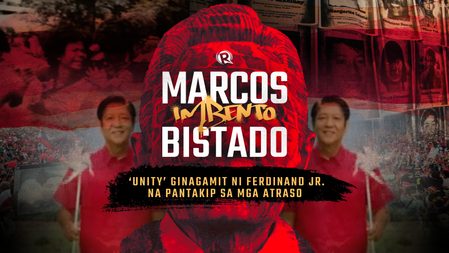SUMMARY
This is AI generated summarization, which may have errors. For context, always refer to the full article.
![[OPINION] Solidarity, not unity](https://www.rappler.com/tachyon/2022/04/tl-1.jpg)
There’s something about unity that inspires people. For a country long marred by political strife, unity spells relief.
That explains Marcos Jr.’s massive appeal.
Forget the fact that his family created the divisions Filipinos endure to this day. For his supporters, the dictator’s son embodies the end of social divides and the start of our national progress.
It might be difficult for us to do so but listening intently to his supporters confirms this point. In my own research, his organic supporters have time and again expressed their disappointment over bitter political divisions. They believe that because Filipinos are divided, the country will never progress.
Thus Filipinos are drawn to Bongbong whenever he claims to be a unifying leader.
Unity of course is a virtuous message. But because it comes from a man with questionable record and character, what it means deserves a second look.
Unpacking unity
Speaking before his supporters at the Philippine Arena, Marcos appealed to the best in the Filipino: “Nasa puso at ugali ng mga Pilipino ang maging mabait. ‘Di naman tayo pala-away, ‘di naman tayo naghahanap ng gulo. Ang hanap lang natin ay magkaroon ng disenteng buhay para sa ating sarili, para sa ating pamilya at para sa ating bansa.”
The remark is noble and it would be difficult to disagree with the man. After all, Filipinos do desire to lead decent lives. As Ambisyon 2040 puts it, “matatag, maginhawa, panatag.”
By appealing to positive Filipino sensibility, this message of unity is deeply moral. And by appealing to the welfare of the nation, it too is a patriotic call.
But the remark is also a moral sleight of the hand. It renders critical questions as “paghahanap ng gulo.”
His campaign team has, for example, used this argument to avoid participating in debates.
No less than Vic Rodriguez has asserted that “pagod na ang tao sa awayan. Kung tayo ay maglalagay lang ng forum para mag-enjoy at makita nag-aaway sila 1, 2, 3, 4, 5 candidates, hindi po kami sasali riyan.”
Worse, avoiding disagreements has also been useful to evade responsibility.
When questions were raised about the Marcos family’s estate tax, Rodriguez countered that it was “all about politics.” His team even accused Isko Moreno’s party of engaging in “negative and hateful campaigning” for bringing it up.
There you have it. The message of unity is internally conflicted.
On the one level, it appeals to positive Filipino sensibilities and patriotic duty. But on another level, it uses exactly those sensibilities to evade responsibility.
His message of unity thus loses its integrity in the hands of Bongbong Marcos. Instead it becomes an evasive tactic to brush off accountability.
Already, we can tell what kind of “unifying leadership” he would exemplify if he were to win the presidency. Only his regime would benefit from it.
But solidarity
In this light I dare say that we don’t need unity. What we need is solidarity.
In the literature on social movements, solidarity is the act of coming together by different sectors of society. An organic formation of alliances among ordinary citizens, solidarity challenges the status quo that benefits only those in power.
To them the status quo is not good enough and they want accountability from the limited few who benefit from it. What compels them are their shared experiences of exclusion. As a result, solidarity challenges people to bridge class and other social divides.
In contrast to unity, people’s solidarity is therefore transformative.
It calls for a change in the way we do politics — where the disadvantaged are given their rightful place in shaping the institutions and policies that affect all of us. From the transportation needs of the daily commuter to the right to the city of the evicted household, great is the call for social and political transformation.
Unity, by contrast, is seductively simplistic. It promises hope but is unwilling to change anything.
Indeed, all it demands, as we have seen above, is conformity. Averse to disruption, this unity only affirms the status quo.
That many of the people behind this message come from the country’s longstanding political dynasties only proves this point.
Conclusion
Bongbong Marcos’s unity, as we now know it, is deceitful. It gives us the good vibes but expects all of us to be subservient in the end.
Worse, it becomes a moral and patriotic weapon to arrest dissent. In this worldview, to dissent is to sow disunity and therefore be a threat to the Filipino aspiration to lead decent lives.
The message of unity is thus insidious. In the final analysis, there is nothing about it that is truly commendable.
What I’m afraid of, however, is that many Filipinos might have in fact already bought into it. We’ve seen the popularity of the war on drugs, the attack on press freedom, and the red-tagging of everyone the state wishes to eliminate.
This means that even if Bongbong Marcos does not win in May, there’s a lot that needs to be done for Filipinos to rediscover the virtues that lie in dissent.
And it all begins, I believe, in being in solidarity with one another. – Rappler.com
Jayeel Cornelio, PhD is the Director of the Development Studies Program at the Ateneo de Manila University. For his contributions to the field of education and sociology, he was recently named among The Outstanding Young Men/People of the Philippines (2021). Follow him on Twitter @jayeel_cornelio.
Add a comment
How does this make you feel?
![[OPINION] Last call for unity to restore freedom and democracy](https://www.rappler.com/tachyon/2022/04/tl.jpg?fit=449%2C449)

![[WATCH] In The Public Square with John Nery: Preloaded elections?](https://www.rappler.com/tachyon/2023/04/In-the-Public-Square-LS-SQ.jpg?resize=257%2C257&crop=414px%2C0px%2C1080px%2C1080px)
![[Newspoint] 19 million reasons](https://www.rappler.com/tachyon/2022/12/Newspoint-19-million-reasons-December-31-2022.jpg?resize=257%2C257&crop=181px%2C0px%2C900px%2C900px)

![[OPINION] The long revolution: Voices from the ground](https://www.rappler.com/tachyon/2022/06/Long-revolution-June-30-2022.jpg?resize=257%2C257&crop=239px%2C0px%2C720px%2C720px)
![[OPINION] I was called a ‘terrorist supporter’ while observing the Philippine elections](https://www.rappler.com/tachyon/2022/06/RT-poster-blurred.jpeg?resize=257%2C257&crop_strategy=attention)
There are no comments yet. Add your comment to start the conversation.